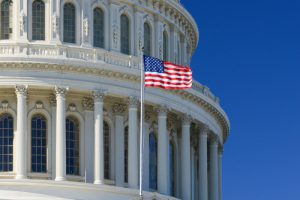
U.S. House Budget Committee Chairman Steve Womack (R-AR) on June 19 unveiled the Budget for a Brighter American Future, the committee’s fiscal year (FY) 2019 federal budget proposal that is scheduled for markup this week.
“A vision that rightly reflects generations-old optimism, Budget for a Brighter American Future offers a balanced and responsible plan to not only address the challenges but give rise to the nation’s prosperity,” Rep. Womack said. “This budget demonstrates that by making the tough decisions in the short-term and building on past economic successes, we can ensure a brighter future for generations of Americans to come.”
The proposal would balance the federal government’s budget in nine years; tackle unsustainable mandatory spending; retain the nation’s economic growth; encourage improved government and accountability; and empower state and local governments, according to a one-page document that summarizes the proposal provided by Rep. Womack’s office.
For example, to balance the federal budget in the proposed nine-year timeframe, the committee suggests achieving $8.1 trillion in deficit reduction over 10 years by slowing down “the unsustainable rate at which debt is growing to less than the American economy’s nominal rate of expansion,” among other provisions, according to the summary.
“It does not make careless or sudden cuts to mandatory spending programs, but rather adopts thoughtful reforms to programs driving our debt and deficits,” according to the summary. “If the nation’s current situation remains unchanged, future generations will face unthinkable choices that could cripple our economy and adversely affect every American family.”
Among numerous provisions, the resolution would make reconciliation instructions for 11 House authorizing committees to achieve at least $302 billion in mandatory savings over the 10-year window, the summary says. The budget also would set topline discretionary spending at $1.24 trillion – $647 billion for defense discretionary spending and $597 billion for non-defense discretionary spending, both of which are consistent with levels signed into law in February, according to the summary.
“History books have long told the story of American exceptionalism, shining still today because of the strong, enterprising spirit of the American people,” said Rep. Womack. “But despite an extraordinary past and a booming economy thanks to tax reform, there are real fiscal challenges casting a shadow of doubt on the nation’s future, including $21 trillion of debt that is rapidly on the rise.
“We must overcome the challenges,” he said, acknowledging that such a task isn’t easy, however, “the alternative of doing nothing is far worse.”
The budget committee was scheduled to consider and mark up the resolution over two days this week, beginning on Wednesday and concluding business on Thursday, according to the congressman.



